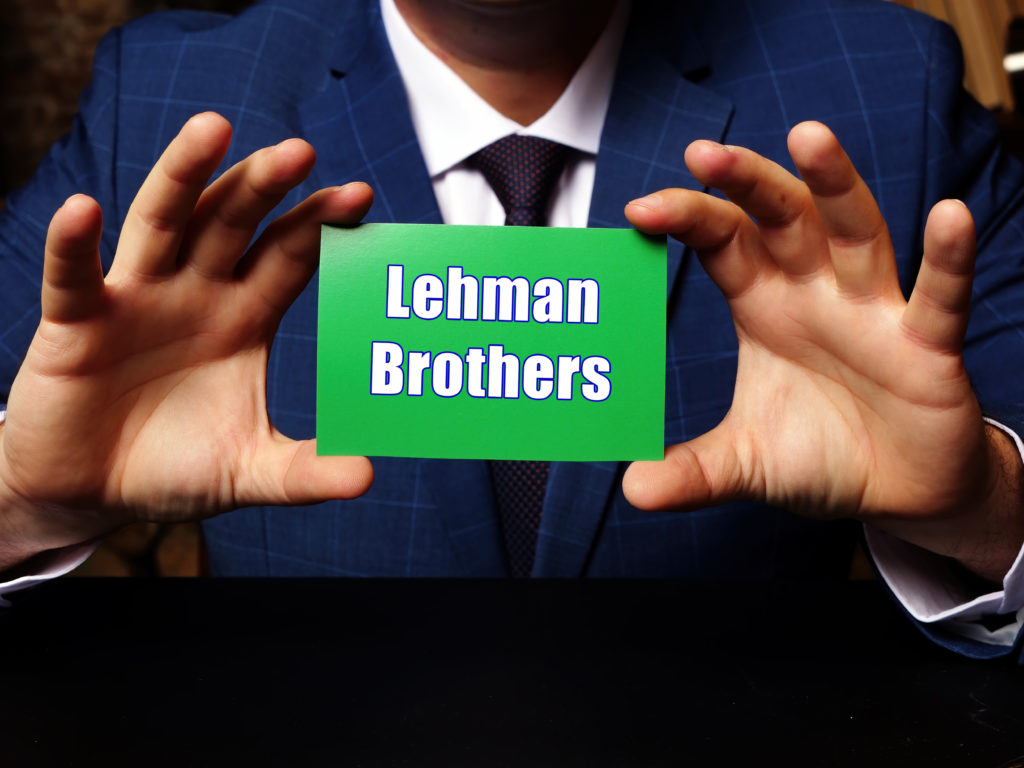“The mere fact that Tiger Lily’s whisky customers have not affirmatively said that they are confused by ‘ask[ing] for a banking product or service’ or ‘indicat[ing] that they felt deceived,’ does not prove that customers have not in fact been confused about whether the whisky is affiliated with Lehman Brothers; the ‘absence of evidence is not always evidence of absence.’” – CAFC
 The U.S. Court of Appeals for the Federal Circuit (CAFC) today issued a precedential trademark decision upholding a Trademark Trial and Appeal Board (TTAB) ruling that sustained two oppositions filed by Barclays Capital Inc. against Tiger Lily Ventures’ applications for registration of the standard character mark “LEHMAN BROTHERS.” The court also affirmed the dismissal of Tiger Lily’s opposition to Barclays’ application for registration of the LEHMAN BROTHERS mark and dismissed Barclays’ cross-appeal.
The U.S. Court of Appeals for the Federal Circuit (CAFC) today issued a precedential trademark decision upholding a Trademark Trial and Appeal Board (TTAB) ruling that sustained two oppositions filed by Barclays Capital Inc. against Tiger Lily Ventures’ applications for registration of the standard character mark “LEHMAN BROTHERS.” The court also affirmed the dismissal of Tiger Lily’s opposition to Barclays’ application for registration of the LEHMAN BROTHERS mark and dismissed Barclays’ cross-appeal.
Following Lehman Brothers’ filing for bankruptcy in 2008, it sold several businesses and assets to Barclays for approximately $1.5 billion. This included assigning all of the LEHMAN BROTHERS trademarks and associated goodwill to Barclays. Barclays eventually allowed all of these marks to expire, and in 2013, Tiger Lily filed Application No. 85/868,892 for registration of LEHMAN BROTHERS for beer and spirits. In October of 2013, Barclays filed Application No. 86/081,143 to register LEHMAN BROTHERS for use in connection with various financial services. And in June 2104, Tiger Lily filed an application for registration of LEHMAN BROTHERS for bar services and restaurant services. Lehman Brothers had used the LEHMAN BROTHERS mark in connection with products that are related to whisky and alcoholic beverages in its marketing.
Barclays filed Notices of Opposition in November 2014 alleging likelihood of confusion and Tiger Lily filed a Notice of Opposition less than a week later arguing that Barclays lacked a bona fide intent to use the mark in commerce. The TTAB consolidated the three oppositions into one proceeding.
Abandonment
In its discussion of the case, the CAFC first agreed with the TTAB’s determination that Barclays had not abandoned the LEHMAN BROTHERS mark. “The decisive factor is Tiger Lily’s apparent acknowledgment that the LEHMAN BROTHERS mark has been used continuously in the course of winding up the affairs of at least one Lehman Brothers affiliated company,” wrote the court. It does not matter that Lehman Brothers will cease to exist once the bankruptcy concludes, because “the bankruptcy has not yet concluded, and the record lacks clear evidence as to when any such conclusion is expected,” the court added.
Furthermore, Barclays has continued to use the mark via its LEHMAN BROTHERS website, research materials and other uses. The CAFC acknowledged these uses were not “extensive” but concluded that it doesn’t matter:
“We acknowledge that Barclays’ use of the mark has not been extensive, and it is possible that Barclays cannot quantify any financial success that may be specifically attributable to its offering of legacy Lehman Brothers market research materials. But under the law, Barclays’ continued use of the mark, even if limited, is sufficient to avoid a finding that the mark has been abandoned.”
Confusion
As to a likelihood of confusion between the marks, the CAFC found that the high degree of fame enjoyed by the LEHMAN BROTHERS mark weighed in favor of a finding of likelihood of confusion, despite Tiger Lily’s arguments that there was a lack of actual confusion because it has been selling whisky products since 2016 without issue. “The mere fact that Tiger Lily’s whisky customers have not affirmatively said that they are confused by “ask[ing] for a banking product or service” or “indicat[ing] that they felt deceived,” see id., does not prove that customers have not in fact been confused about whether the whisky is affiliated with Lehman Brothers; the “absence of evidence is not always evidence of absence,” said the court
Tiger Lily also argued that the Board abused its discretion in failing to strike testimony from certain witnesses that was “based on hearsay, speculation, and wishful thinking, and that privilege was improperly asserted,” but the court rejected this argument as well.
The CAFC did agree with Tiger Lily that Barclay’s cross-appeal opposing Tiger Lily’s marks for “false suggestion of connection, dilution, and lack of bona fide intent” was improper because the proposed four grounds for opposing Tiger Lily’s marks “each ask[ed] for the same result—that the Board refuse registration of Tiger Lily’s marks.” Since Barclays can’t appeal from a judgment in which it prevailed, the court said this was improper and dismissed the cross-appeal, though it said it might have considered the arguments in it as alternative grounds for affirmance if it hadn’t already affirmed on likelihood of confusion.
Image Source: Deposit Photos
Author: rummess
Image ID: 455165608

![[IPWatchdog Logo]](https://ipwatchdog.com/wp-content/themes/IPWatchdog%20-%202023/assets/images/temp/logo-small@2x.png)

![[Advertisement]](https://ipwatchdog.com/wp-content/uploads/2024/04/Patent-Litigation-Masters-2024-sidebar-early-bird-ends-Apr-21-last-chance-700x500-1.jpg)

![[Advertisement]](https://ipwatchdog.com/wp-content/uploads/2021/12/WEBINAR-336-x-280-px.png)
![[Advertisement]](https://ipwatchdog.com/wp-content/uploads/2021/12/2021-Patent-Practice-on-Demand-recorded-Feb-2021-336-x-280.jpg)
![[Advertisement]](https://ipwatchdog.com/wp-content/uploads/2021/12/Ad-4-The-Invent-Patent-System™.png)







Join the Discussion
No comments yet.